九年级英语上册第四单元.单元语法专项
九上英语四单元语法
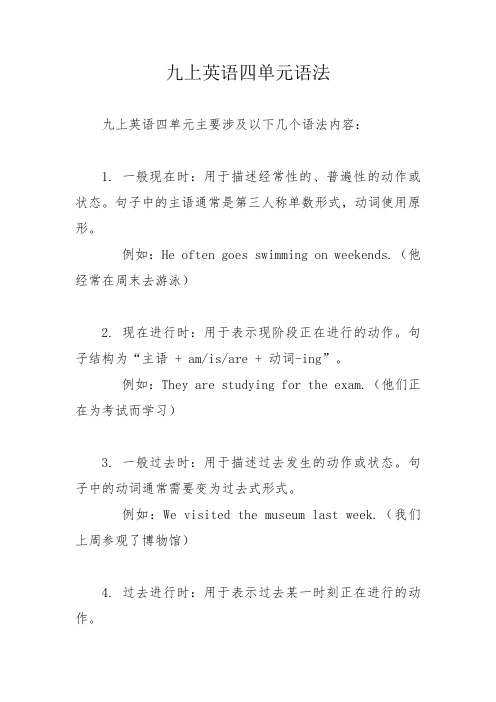
九上英语四单元语法
九上英语四单元主要涉及以下几个语法内容:
1. 一般现在时:用于描述经常性的、普遍性的动作或状态。
句子中的主语通常是第三人称单数形式,动词使用原形。
例如:He often goes swimming on weekends.(他经常在周末去游泳)
2. 现在进行时:用于表示现阶段正在进行的动作。
句子结构为“主语 + am/is/are + 动词-ing”。
例如:They are studying for the exam.(他们正在为考试而学习)
3. 一般过去时:用于描述过去发生的动作或状态。
句子中的动词通常需要变为过去式形式。
例如:We visited the museum last week.(我们上周参观了博物馆)
4. 过去进行时:用于表示过去某一时刻正在进行的动作。
句子结构为“主语 + was/were + 动词-ing”。
例如:She was watching TV when I called her.(我打电话给她时,她正在看电视)
5. 一般将来时:用于表示将来发生的动作或状态。
句子结构为“主语 + will + 动词原形”。
例如:I will visit my grandparents next month.(我下个月会去看望我的祖父母)
这些是九上英语四单元的一些主要语法内容,了解并掌握这些语法知识将有助于你在学习中更好地理解和运用英语。
如果有任何具体的问题,请随时提问!。
九年级上册英语第四单元
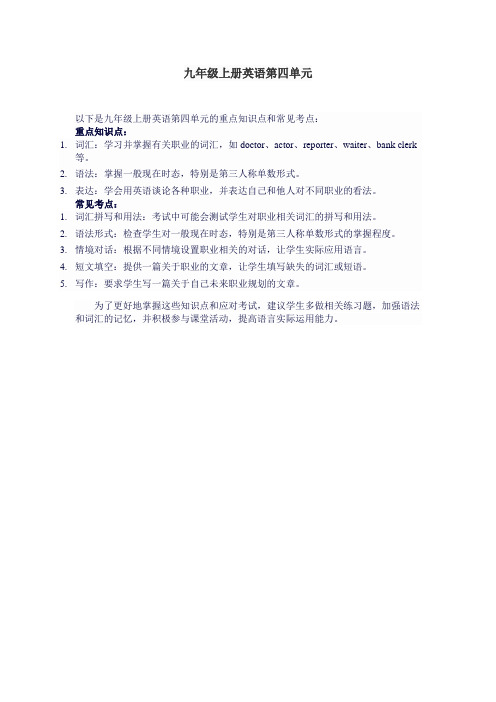
九年级上册英语第四单元
以下是九年级上册英语第四单元的重点知识点和常见考点:
重点知识点:
1.词汇:学习并掌握有关职业的词汇,如doctor、actor、reporter、waiter、bank clerk
等。
2.语法:掌握一般现在时态,特别是第三人称单数形式。
3.表达:学会用英语谈论各种职业,并表达自己和他人对不同职业的看法。
常见考点:
1.词汇拼写和用法:考试中可能会测试学生对职业相关词汇的拼写和用法。
2.语法形式:检查学生对一般现在时态,特别是第三人称单数形式的掌握程度。
3.情境对话:根据不同情境设置职业相关的对话,让学生实际应用语言。
4.短文填空:提供一篇关于职业的文章,让学生填写缺失的词汇或短语。
5.写作:要求学生写一篇关于自己未来职业规划的文章。
为了更好地掌握这些知识点和应对考试,建议学生多做相关练习题,加强语法和词汇的记忆,并积极参与课堂活动,提高语言实际运用能力。
人教版九年级上册第四单元语法知识点梳理

人教版九年级上册第四单元语法知识点梳理Unit 4:I used to be afraid of the dark.第四单元的语法重点是:used to的用法;if引导条件状语从句;few和little。
used to的用法:used to是一个固定结构,意为“过去经常;以前常常”,其后接动词原形。
它表示过去存在某种状态或者过去的某种经常性、习惯性的行为或者动作。
★其用于肯定句的结构为:主语+used to+动词原形+其他。
如:I used to play ping-pong with my brother.过去我常常和我哥哥一起打乒乓球。
★其用于否定句的结构为:主语+didn't+use to+动词原形。
如:You didn't use to like action movies.你过去不喜欢动作片。
★其用于一般疑问句的结构为:Did+主语+use to+动词原形+其他?如:Did your sister use to be shy?你的妹妹过去害羞吗?【辨析:】be used to(doing)sth意为“习惯于(做)某事”,to后可接名词、代词或动名词。
如:The students are used to the new teacher now.学生们现在习惯这个新老师了。
They are used to raising their hands first when they want to ask questions.他们习惯了问问题前先举手。
if引导条件状语从句:★if引导的非真实性条件状语从句即虚拟语气,通过动词形式的变化来表示说话人对发生的动作或存在的状态所持的态度或看法的动词形式称为语气,虚拟语气表示说话人所说的话不是事实,而是一种祝愿,建议或是与事实相反的假设等。
★if引导的条件状语从句分为真实和非真实条件句,非真实条件句应用虚拟语气。
如果要表示与现在或将来事实相反时,其虚拟语气结构为:句型条件从句主句谓语动词形式动词过去式(be动词用were)would动词原形即:(从句)if主语+动词过去式(be动词用were),一般过去时(主句)主语+would+动词原形过去将来时。
冀教版九年级英语上册第四单元语法归纳
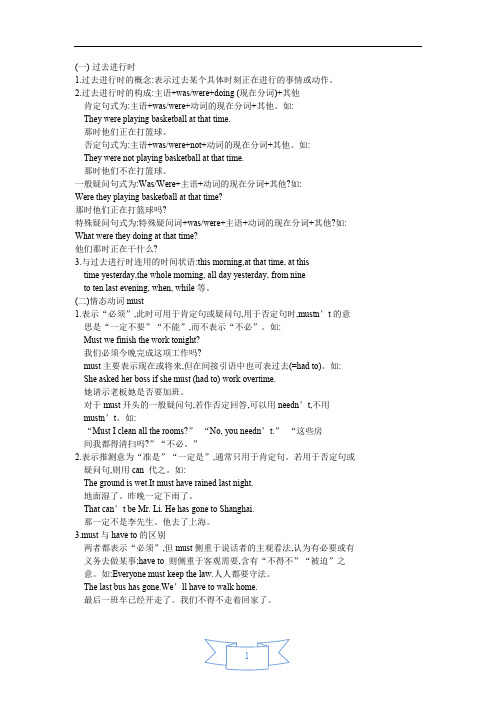
(一)过去进行时1.过去进行时的概念:表示过去某个具体时刻正在进行的事情或动作。
2.过去进行时的构成:主语+was/were+doing (现在分词)+其他肯定句式为:主语+was/were+动词的现在分词+其他。
如:They were playing basketball at that time.那时他们正在打篮球。
否定句式为:主语+was/were+not+动词的现在分词+其他。
如:They were not playing basketball at that time.那时他们不在打篮球。
一般疑问句式为:Was/Were+主语+动词的现在分词+其他?如:Were they playing basketball at that time?那时他们正在打篮球吗?特殊疑问句式为:特殊疑问词+was/were+主语+动词的现在分词+其他?如: What were they doing at that time?他们那时正在干什么?3.与过去进行时连用的时间状语:this morning,at that time, at thistime yesterday,the whole morning, all day yesterday, from nineto ten last evening, when, while等。
(二)情态动词must1.表示“必须”,此时可用于肯定句或疑问句,用于否定句时,mustn’t的意思是“一定不要”“不能”,而不表示“不必”。
如:Must we finish the work tonight?我们必须今晚完成这项工作吗?must主要表示现在或将来,但在间接引语中也可表过去(=had to)。
如: She asked her boss if she must (had to) work overtime.她请示老板她是否要加班。
对于must开头的一般疑问句,若作否定回答,可以用needn’t,不用mustn’t。
九年级英语上册第四单元知识点

九年级英语上册第四单元知识点Unit 4 I used to be afraid of the dark.一.短语归纳1.be more interested in对…更感兴趣2.on the swim team游泳队的队员3.be terrified of害怕4.gym class体操课5.worry about担心6.all the time一直,总是7.chat with与…闲聊8.hardly ever几乎从不9.walk to school=go to school onfoot步行去上学take the bus to school=go to schoolby bus乘车去上学10.as well as不仅…而且...二.用法集萃ed to do sth过去常常做某.2.be afraid of doing sth害怕做某事3.have to do sth必须做某事4.make sb do sth让某人做某事5.give up doing sth放弃做什么6.try to do sth尽力做某事7.adj+enough to do sth足够…而能够做某事8.be prepared to do sth准备做某事9.see sb doing sth看见某人在做某事10.begin to so sth开始做某事11require sb to do sth要求某人做某事12.decide to do决定做某事13.make a decision to do sth决定做某事14.It‘s hard to believe that…很难相信……15.It+has+been+一段时间+since+从句自从……以来已经有很多长时间了16.dare to do sth敢于做某事17.It‘s adj+for sb+to do sth对某人来说做某18.take up doing sth开始做某事三.语法全解1.辨析:used to do sth.过去常常做…get/be used to sth./doing sth.习惯于…be used to do被用于做…(被动语态)be used by由(被)…使用(被动语态)be used as…被当做…使用(被动语态)be used for doing被用于做…(被动语态)例:I used to go to work by bus.Now I take a taxi.He used to be a problem boy.She used to be very shy.I‘m used to drinking a cup of water after meal.He‘s been used to living in the dormitory.A hammer is used to drive nails.This machine is used to clean the floor.The girl is being used as a servant in the house.A knife can be used for cutting bread.2)afford(支付得起)的用法afford sth买得起……afford to do sth有足够的…去做…例:His mother couldn‘t afford to pay for her child‘s education. They did not consider whether they could afford the time or not. We can‘t afford to pay such a price.(such和so区别见P110)3)take pride in sth/sb=be proud of sth/sb为…感到自豪例:He was watching me and take pride in everything good I do.I take pride in my child.=I‘m proud of my child.注:He take pride in everything good I do.这是一个定语从句。
九年级上册英语Unit4单元知识点
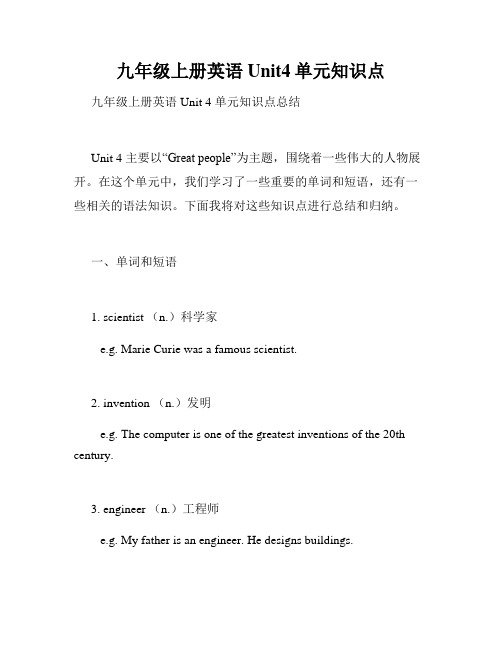
九年级上册英语Unit4单元知识点九年级上册英语Unit 4 单元知识点总结Unit 4 主要以“Great people”为主题,围绕着一些伟大的人物展开。
在这个单元中,我们学习了一些重要的单词和短语,还有一些相关的语法知识。
下面我将对这些知识点进行总结和归纳。
一、单词和短语1. scientist (n.)科学家e.g. Marie Curie was a famous scientist.2. invention (n.)发明e.g. The computer is one of the greatest inventions of the 20th century.3. engineer (n.)工程师e.g. My father is an engineer. He designs buildings.4. reflect (v.)反射;反映e.g. The mirror reflects light.5. electricity (n.)电力e.g. We use electricity to power our homes.6. successful (adj.)成功的e.g. Bill Gates is a successful businessman.7. revolution (n.)革命e.g. The Industrial Revolution had a great impact on society.8. achieve (v.)实现;取得e.g. If you work hard, you can achieve your goals.9. feature (n.)特征;特点e.g. This new smartphone has many great features.10. create (v.)创造e.g. Beethoven created many beautiful symphonies.二、语法知识1. 形容词的比较级和最高级a. 基本形式:原级b. 比较级:原级+erc. 最高级:原级+este.g. brave(勇敢的)→braver(更勇敢的)→bravest(最勇敢的)2. 物主代词a. 形容词性物主代词:my, your, his, her, its, our, theirb. 名词性物主代词:mine, yours, his, hers, (ones) ours, theirs3. 定义性从句定义性从句用来对前面所提的名词或代词给出进一步的解释或说明。
人教版初中英语九年级上册单元语法小专题[4]-课件
![人教版初中英语九年级上册单元语法小专题[4]-课件](https://img.taocdn.com/s3/m/aa930742640e52ea551810a6f524ccbff021ca61.png)
You ought to take care of the baby.你应该照顾这个宝宝。 ②表示劝告、建议和命令时should,ought to可通用,但在 疑问句中常用should。如: You should/ought to go to class right away.你应该马上去上 课。 Should I open the window?我应该打开门吗?
to be
living to make
to go
________________ true that he was fooled by a five- year-old boy? 20. 你的车需要m维u修st 了be。
Your car ________________________. 21. 这种小刀是用来切东西的。
10.If the traffic light is red,you ________ cross the road.
It's dangerous.
needn't
may/might
mustn't
14. There used ________ (be) a quiet village here. 15. I think you will be used to ________ (live) in the
might比 may语气更委婉,而不是过去式。否定回答时可用 can't或mustn't,表示“不可以,禁止”。 用“May I…?”征询对方许可时比较正式和客气,而用 “Can I…?”在口语中更常见。 ②用于祈使句,表示祝愿。如: May you succeed!愿你成功!
习本吗? —Yes,you must.(No,you don't have to/you needn't.)是的,你 们必须今天交。(不,你们不一定要今天交。) ②must是说话人的主观看法,而have to则强调客观需要。must只 有一般现在时,而have to 有更多的时态形式。如: I had to work when I was your age.我像你这么大时,就必须工作 了。
新译林版英语九年级上册第四单元词组句型及语法复习提纲
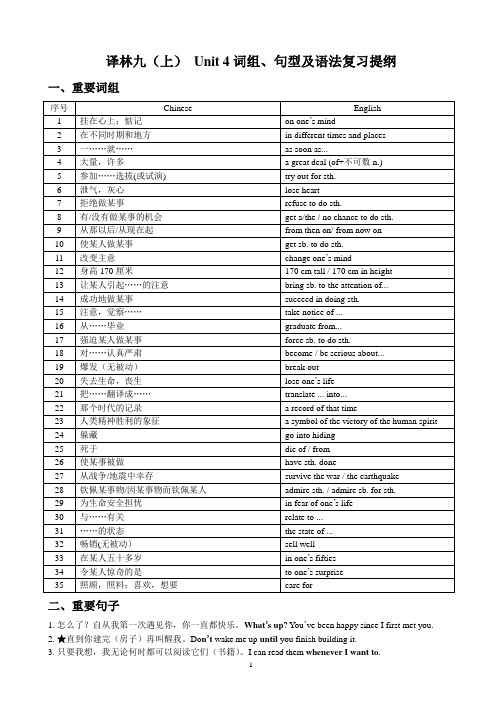
译林九(上)Unit 4词组、句型及语法复习提纲一、重要词组二、重要句子1.怎么了?自从我第一次遇见你,你一直都快乐。
What’s up? You’ve been happy since I first met you.2.★直到你建完(房子)再叫醒我。
Do n’t wake me up until you finish building it.3.只要我想,我无论何时都可以阅读它们(书籍)。
I can read them whenever I want to.4.★一旦点击鼠标,就有大量心血。
As soon as you click the mouse, there’s a great deal of information.5.★★上初中的时候,斯巴德去参加校(篮球)队选拔,但是因为他太瘦小,起初被拒绝了。
While attending junior high, Spud tried out for the school team, but he was refused to play at first because he was too small.6.★他练习得甚至更努力了并让教练改变了主意。
He practised even harder and got the coach to change his mind.7.但是,没有大学会邀请他去打篮球,仅仅因为他只有170厘米高。
However, no university would invite him to play basketball simply because he was only 170 cm tall.8.★在那儿他带领他的队进入了全国锦标赛。
There he led his team to the national championship.9.毕业后,他被迫在另一个篮球联盟打球。
After graduated, he was forced to play in another basketball league.10.1985年,他加入亚特兰大老鹰队,成为当时NBA最矮的球员。
